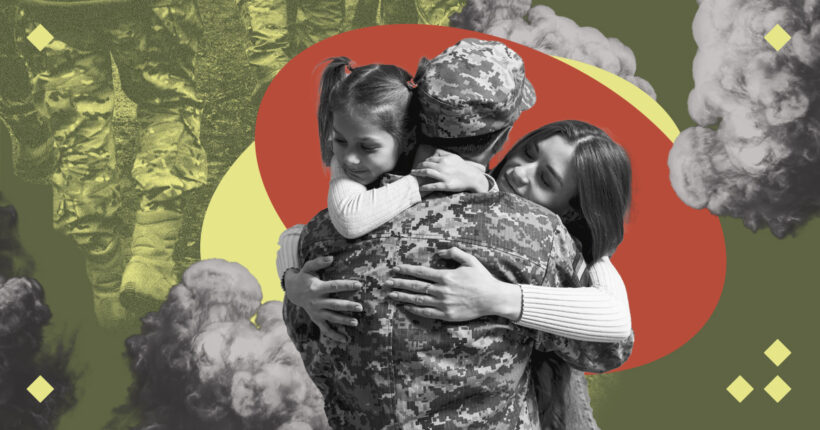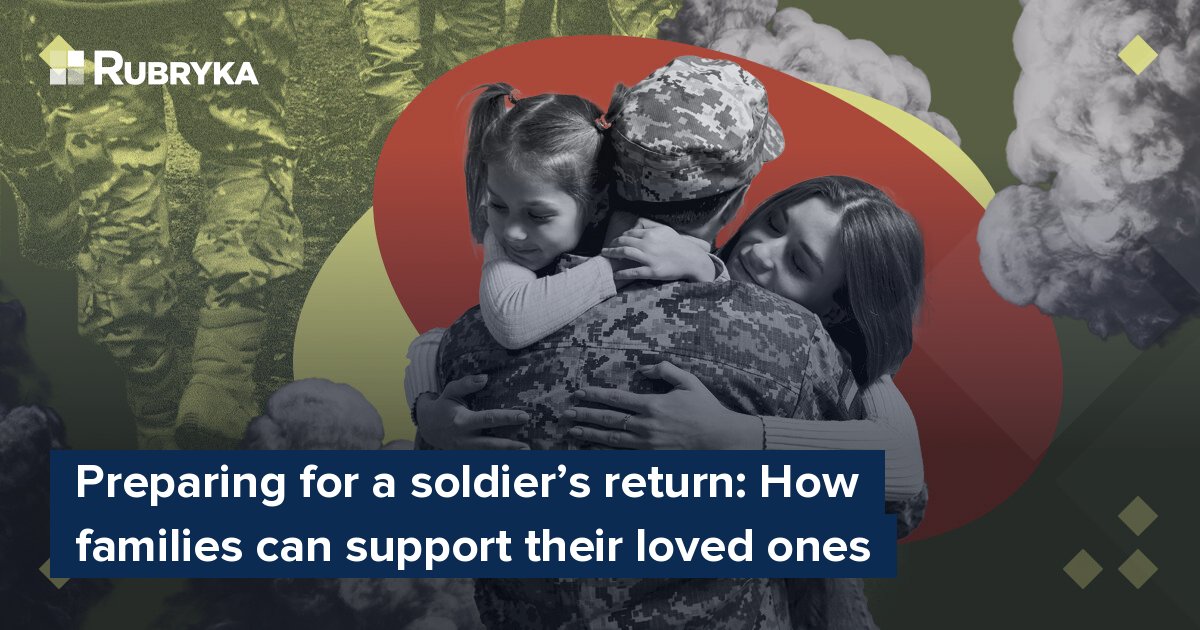
What is the problem?
Disturbed sleep, unexpected reactions to everyday situations, emotional outbursts, or prolonged tense silence can become part of daily life for the entire family. In such circumstances, misunderstanding and alienation may develop, especially if the family is unprepared for these changes.
What is the solution?
To support a loved one who has experienced military action and to maintain an emotional connection in your relationship, it is crucial to understand how to approach communication and provide proper support to the returning defender.
Rubryka interviewed Tetiana Pavlenko—a psychotherapist, sexologist, family psychologist, and author of nearly 20 books on psychology—about the challenging yet vital moments both partners face while adapting to a new reality shaped by the experience of war.
How does it work?
First and foremost, it's important to reflect on the state of the relationship before one or both partners joined the military. War is an immense source of stress for everyone, but it often becomes a trigger for partners to finally "let out" everything that has built up over the years and to confront the truth about their relationship. Couples who were happy together before the war are more likely to overcome challenges successfully and are also more open to seeking help from a psychologist, Pavlenko notes.

A servicemember with family. Photo from open sources
How can soldiers change after returning from the front?
According to the expert, it's important to distinguish between different situations when addressing this issue. Rotation, for instance, involves only a temporary return home, which is significantly different from a permanent return after the war.
- A soldier on rotation may feel relatively better than one who has permanently returned. In the case of rotation, the ongoing stress of knowing they must return to battle prevents full relaxation and keeps the individual in a state of heightened mobilization. However, when a soldier returns home permanently, the initial stress dissipates, leading to a period of relaxation where deep-seated pain and emotions begin to surface.
- This pain often stems from a sense of lost security and home, compounded by the grief of losing comrades. Such individuals may feel alienated, believing that the world around them cannot understand their experiences. This can result in withdrawal, fear of communication, reluctance to share their feelings, and a self-perception as someone who might harm their loved ones emotionally.
- Mental health disorders may also arise, with behaviors varying widely depending on the case. In these situations, professional help is essential to navigate the complexities of recovery and adaptation.
For military personnel, the most common issues include concussions, combat trauma, depression, and post-traumatic stress disorder (PTSD). While it is not difficult for a specialist to identify and address these conditions, the key factor is the willingness of both the service members and their families to seek help and work through the challenges together.
"Unfortunately, there are instances where relatives dismiss a loved one's depression as laziness and refuse to acknowledge the problem. Similarly, in cases of PTSD, some families react with fear, ignoring the signs in an attempt to preserve their own emotional and day-to-day stability," explains Pavlenko.
Relatives of military personnel should be aware of the following signs of PTSD:
- The individual may fixate on certain thoughts or memories that cause anxiety. Their brain perceives these experiences not as past events but as something ongoing. As a result, their actions may seem illogical. It's important to understand that this behavior is not related to their feelings toward loved ones or their personality—it stems from psychological trauma.
- The person may expect something bad to happen at any moment, even in mundane situations. This heightened vigilance may lead them to exert excessive control over loved ones in everyday matters, which can inadvertently cause frustration or irritation.
- Hyperexcitability. The individual may become easily irritated by things that previously brought joy, such as sounds, light, or even the voices of family members.
- Feelings of guilt. They may irrationally blame themselves for everything, viewing themselves as a burden or even as a monster.
- Avoidance of discussing problems. "We often want to talk to loved ones when they seem distressed, hoping to understand what's wrong," explains Pavlenko. "However, someone with PTSD may avoid such conversations entirely, even if they were previously open. This avoidance is a key sign that professional help may be needed."
- Panic attacks and suicidal thoughts. Over time, the nervous system becomes exhausted, potentially leading to panic attacks and thoughts of self-harm. It's important to recognize that in a healthy state, the individual would not harm themselves—this is the disease speaking, and it requires immediate treatment.

Photo from open sources
How can partners prepare for these changes in advance?
The psychotherapist stresses that ignoring the conditions described above, dismissing them as "simple fatigue," or attempting to "treat" them without professional guidance is highly dangerous.
For instance, when a soldier's family sees that they have seemingly "rested and caught up on sleep" and begins pressuring them to "get back to normal," take on household responsibilities, or act as they did before the war, it is counterproductive and harmful.
"We are all affected by war to some extent, but military personnel are impacted even more deeply. Their exhaustion is not 'simple fatigue'—it is chronic fatigue," explains Pavlenko. "Simple fatigue is when someone rests after a workday and recovers. In cases of depression or PTSD, this doesn't happen. These conditions require medical treatment. There is plenty of information available now, and psychiatrists are accessible. The worst mistake is to fear seeking professional help."
The psychologist also cautions against the opposite extreme. While life is unpredictable, constantly preparing for the worst, living in fear, and exhausting yourself with negative expectations can lead to moral burnout, anxiety, and related disorders.
The best way to support a serviceman is to ensure they can focus on their tasks and their own well-being without worrying about you. To achieve this, it's essential to manage your own emotions and maintain your personal resources.
During moments of heightened anxiety and concern, it's helpful to engage in activities that distract and calm you. These could include reading, sports, embroidery, or anything that keeps both your hands and mind occupied.
When your partner returns, it's normal to go through a period of adjustment as you both reacquaint yourselves with each other. It's important to recognize that during this time, not only your partner but also you may have changed. Don't shy away from discussing these changes openly.
"However, this process is highly individual," notes Pavlenko. "If open communication worked in the relationship before, it will likely work again. But if the couple struggled to address issues openly in the past, this may continue to be a challenge. That said, I believe it's important to talk about everything that matters to you, rather than ignoring the 'elephant in the room' or pretending the problem doesn't exist."
At the same time, the military partner has the right to decline the conversation or postpone it. In such cases, it's crucial not to apply pressure. Instead, express your willingness to support them and continue the dialogue whenever they feel ready.
How to avoid feeling guilty or helpless when "nothing works out"?
"There is no way. At the initial stage of interaction, it's completely normal to feel that way. This reaction arises when you can't help a loved one, similar to pulling your hand away from a hot pan. The problem arises when these emotions become chronic," explains the psychotherapist.
It's essential to remember that your partner is an adult who has the right to make their own decisions and express their own desires. There's no need to pressure or persuade them. Instead, focus on simply being there when your loved one needs you. Seeking help from a psychologist can also be beneficial.
"In family therapy, we learn how to adapt to new realities in a way that ensures the safety and well-being of all family members. We work through feelings of guilt and shame, and we learn how to love each other sincerely," says Pavlenko.
If you lack the motivation or opportunity to visit a psychologist, it's helpful to seek resources in "childlike" activities. Think about what would bring you joy as a child and make time to do it at least once a day. It could be drawing, solving puzzles, lying in the bath, walking, or anything else that feels comforting.
"Physical practices are often effective for relieving tension. There are plenty of them available online, but consistency is key," adds Pavlenko.
You can also alleviate stress by interacting with different people and discussing a variety of topics. Avoid isolating yourself with the belief that no one will understand you. While it's true that others may not fully understand your unique situation, your goal is to bring something familiar and stable back into your life.
Introducing new family traditions can also help, such as having breakfast together or going to the movies every Sunday. These traditions should be maintained consistently, no matter the circumstances, and should involve everyone. However, they should not be used as tools for discipline or manipulation.
"Ultimately, the regular rhythm of life will need to change. This is a natural part of welcoming something new into the family, whether it's a positive or challenging change. Try to live as fully as possible within the current conditions, taking care of each other's physical and emotional needs, as well as everyone's safety. If you find that you no longer have the strength to do this, and you are overwhelmed by feelings of shame or guilt, it's best to seek help from a psychologist," concludes Pavlenko.
Newsletter
Digest of the most interesting news: just about the main thing






